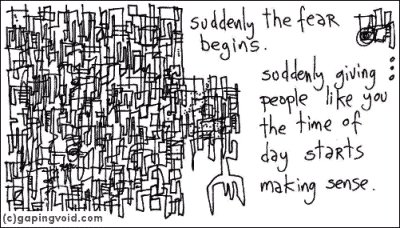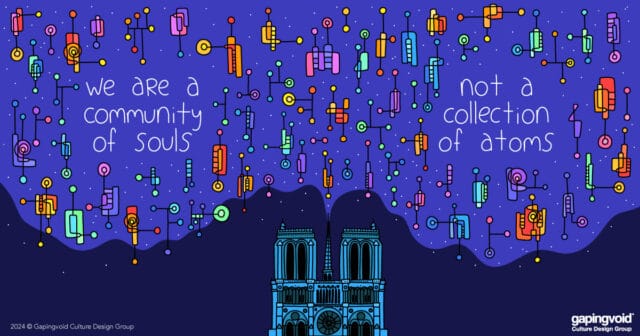
A young friend of mine, who graduated from university only a year or two ago, offered me this piece of advice about about expanding “How To Be Creative” into a traditional book format:
It’s about taking one’s creativity and learning how to harness it and apply it to anything one undertakes (including careers/business), despite the fact that the business world tends to kill creativity; in other words, don’t focus on life… focus on professional life. As a member of the demographic you’re aiming for [i.e. people my age], I can tell you that we’re more interested in that; it’s easy to be creative on our own time. At work, not so much.
Here are some opening thoughts, by no means a definitive list:
1. Add 25% to amount of hours you work every week, and fill them with fun, interesting, useful stuff. Google allows its employees 20% of their work time to devote to their own personal projects. If your employer won’t allow you to do this, you should unilaterally make the time for yourself, either at the office or at home, hence the extra 25%. Your peers in the office may think you weird at first, but after a while it’ll start paying off.
2. I had no life in my 20’s. Get used to the same. While my peers were partying or zoning out to TV sitcoms, after work I’d head for the coffee shop or the bar, and crank out cartoons until bedtime. Sure, I must have looked a real lonely ol’ saddo, sitting there doodling away in the corner by myself, but at the time I didn’t really care. I really enjoyed doing it, plus I knew I was on to something. Besides, the typical twentysomething TV-and-Budweiser-enhanced nighttime existence didn’t interest me too much. Tis more blessed to make than to consume etc.
3. All business is creative, just sometimes it’s hard to see it. And it’s especially hard to see it when you’re leaving the office at the same time as all the other yutzes you work with.
4. Creative people like other creative people, even if they’re far more senior than you. The great thing about creative people with power and money, is that they would much rather have somebody working for them who reminds them of themselves when they, too were young, rather than remind them of the jocks and cheerleaders they went to highschool with. And you know what? Finding those kind of young people is actually harder than it seems. Truly bright sparks who are honest, reliable and hard-working are rare, even in the younger cohorts. So if you ever meet an older “Creative” like that, don’t be scared of her. Don’t be scared to seek her out. She’s probably just as delighted to have found someone she can give a real opportunity to, as you are for finding someone offering a real opportunity.
5. P.S. When I use the word “creative”, I prefer to use it in quotation marks, metaphorical or otherwise. As words go, it’s pretty meaningless. There are a lot of people in the “creative” industries who wouldn’t know an original idea if it jumped on their lap and peed on them. Aimee Plumley was right. Hipsters ARE annoying. Truly creative people tend to defy the usual stereotypes. Always keep that in mind.
6. Never, ever forget the “Sex & Cash Theory”.The creative person basically has two kinds of jobs: One is the sexy, creative kind. Second is the kind that pays the bills. Sometimes the assignment covers both bases, but not often.
7. Always remember: You’re playing the long game. General Kutuzov told the Russian Royal Court that all he needed to defeat Napoleon was “patience and time”. His strategy horrified a lot of people close to the Czar, who were hoping for something a bit more swift and glorious. But it was “patience and time” that allowed the good ol’ Russian winter to come along, and freeze all those poor Frenchmen to death. The rest is history.
Any other thoughts for my friend? Please feel free to leave a comment. I can already see that I’m going to have to give this a lot more thought over the next wee while.



